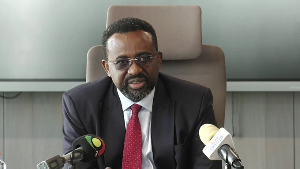Research Scientist at Columbia University, Dr. Daniel Westervelt has raised concerns on the need for Ghana to put in place a good waste management policy to improve the country’s air quality.
He described as poor the quality of air in Ghana, as he highlighted the adverse effects of such a situation on the health of citizens.
Addressing the media on the quality of air in Ghana, he lamented on the poor air quality blaming the cause on refuse burning, agricultural burning, vehicle emissions, large cities with a lot of inhabitants, regional biomass burning, and traditional pollutants sources such as industry.
“There is a lot of things that in a perfect world it could be done but we have to understand that this is not a place that has all the resources as well as the abilities compared to say the US. I certainly think that some of the open burning issues, if the government could help avoid that issues by promoting other waste disposal systems as well as policies, which will go a long way to improve air quality and other health issues as well.”
He, therefore, called for broader stakeholder consultation to come up with an effective waste management policy to alleviate air pollution.
Dr. Westervelt further compared air quality across the globe as he noted that Africa needed much more attention.
The absence of data on the severity of the pollution has made way for inaccurate tracking of the quality of air, he noted.
Way forward
Dr, Westervelt, Ph.D., who identified the causes and effects of the poor air quality in Ghana, and West Africa as a whole, recommended capacity building with local researchers, sharing knowledge, scholar exchange as some of the tools to tackling the issue.
He also recommended partnership networks amongst scientists, practitioners, citizens and local governments as ways of addressing poor quality of air.
To tackle air pollution, which is the major cause of the poor quality of air in Ghana, Dr, M Westervelt, Ph.D. advised that the government increase awareness on the consequences of air pollution, as well as increase availability of data.
“People might not know the consequences of air pollution. The effect is not immediate and that’s why we need to educate them on the negative effects of polluting the air. Having data and sharing data is very important,” he said.
General News of Saturday, 7 March 2020
Source: www.ghanaweb.com
Better waste management policy will improve air quality in Ghana - US Researcher
Most of the air pollution come from vehicle and open burnings - Daniel Westervelt
0 seconds of 3 minutes, 21 secondsVolume 90%
Press shift question mark to access a list of keyboard shortcuts
Keyboard Shortcuts
Shortcuts Open/Close/ or ?
Play/PauseSPACE
Increase Volume↑
Decrease Volume↓
Seek Forward→
Seek Backward←
Captions On/Offc
Fullscreen/Exit Fullscreenf
Mute/Unmutem
Decrease Caption Size-
Increase Caption Size+ or =
Seek %0-9

















